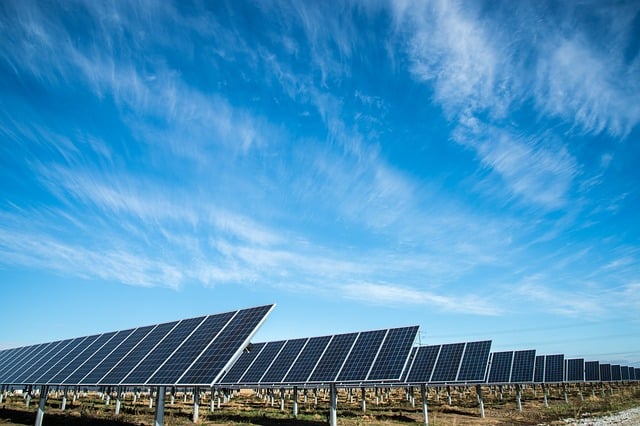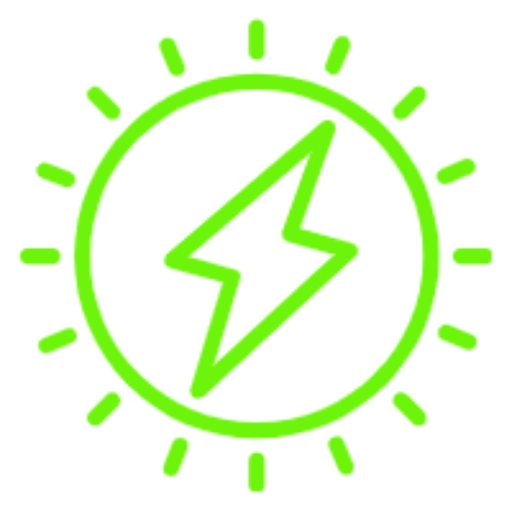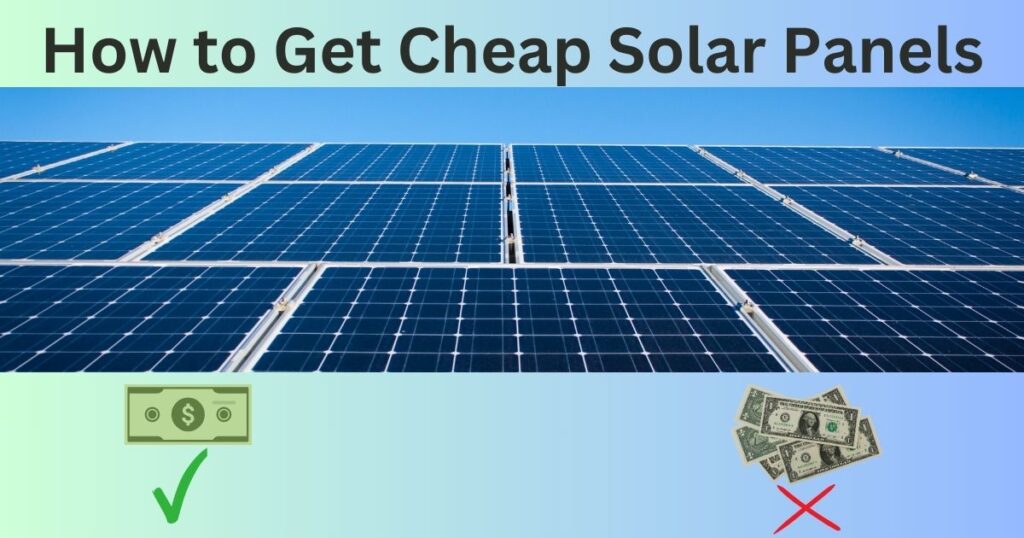Last updated on March 18th, 2025 at 01:05 pm
How to get cheap solar panels is something more and more people are asking as the push for solar energy continues to grow. With rising energy costs and a growing awareness of environmental sustainability, more homeowners and businesses are looking to make the switch to solar power.
But let’s be honest—the upfront cost of solar panels can be pretty steep, which is why so many are on the hunt for ways to get them at a lower price without giving up on quality.
In this article, you’ll discover proven strategies and insights on how to get cheap solar panels without sacrificing performance. You will be equipped with a comprehensive understanding of where and how to find the best deals, what factors to consider to ensure you’re getting value for your money, and how to navigate the financial options available.
- To find affordable solar panels, consider bulk buying, community solar programs, and checking for seasonal discounts or refurbished options.
- Panel prices differ based on type, brand, and quality, with factors like efficiency, warranty, and installation costs influencing the final price.
- Explore solar loans, leases, or Power Purchase Agreements (PPAs) to spread costs and make solar energy more accessible without a large upfront investment.
Factors Influencing Solar Panel Prices
When it comes to buying solar panels, understanding what influences their price can help you make a smarter, more cost-effective choice. Let’s break down the key factors that can drive up or bring down the cost of solar panels, so you know what to look for when shopping around.
Type of Solar Panel
The type of solar panel you choose greatly affects the price. Monocrystalline panels are the most expensive due to their higher efficiency and durability, as they’re made from a single, pure silicon crystal.
Polycrystalline panels are cheaper but slightly less efficient, made from silicon fragments. Thin-film panels are the least expensive and least efficient, best suited for larger installations where space isn’t a concern.
Panel Size and Power Output
The size and power output of the panels you choose will affect the price. Larger panels with higher wattage output are generally more expensive because they can produce more energy. But again, if you need fewer of them to meet your energy needs, you might save money in the long run.
Panel Efficiency
Efficiency refers to how well a solar panel converts sunlight into electricity. The more efficient the panel, the more power it can generate, which often means you need fewer panels to meet your energy needs.
High-efficiency panels, like those made with monocrystalline silicon, typically come with a higher price tag. But if you have limited roof space or want to maximize your energy production, investing in more efficient panels could save you money in the long run.
Installation Costs
Don’t forget about installation—this can be a big part of the overall cost. The complexity of the installation, the type of roof you have, and the labor rates in your area all play a role.
If your roof is tricky to work with, or if you live in an area with high labor costs, you might end up paying more. Some companies offer all-in-one packages that include installation, which could be more affordable than hiring a separate contractor.
Brand and Manufacturer
When it comes to solar panels, the brand and manufacturer can significantly influence the price. Established brands like SunPower, LG, and Panasonic are known for high-quality, durable panels and tend to charge more due to their strong reputations.
These companies often provide better warranties and customer support, making the higher cost worth it for those seeking reliability and peace of mind. On the other hand, lesser-known brands like Renogy, Canadian Solar, and JA Solar might offer more affordable panels, but you should do thorough research to ensure you’re not compromising on quality.
Market Demand and Supply
Solar panel prices can also fluctuate based on market demand and supply. For example, if there’s a surge in demand due to government incentives or a push for renewable energy, prices might go up.
Conversely, if there’s an oversupply of panels or advancements in manufacturing that lower production costs, prices could drop. Keeping an eye on these trends can help you time your purchase to get the best deal.

How to Get Cheap Solar Panels: Tips and Strategies
Buy in Bulk
Buying in bulk is one of the most effective ways to reduce the cost of solar panels. Group purchases, often organized by neighborhoods, communities, or solar co-ops, allow multiple households to buy solar panels together at a discounted rate.
Solar companies are often willing to offer lower prices when they can sell a large volume at once, reducing both their marketing and distribution costs. Community solar initiatives, where multiple participants share the benefits of a single solar installation, can also lower costs by spreading the expense across several users.
.
Look for Discounts and Promotions
Timing your purchase to coincide with discounts and promotions can lead to significant savings on solar panels. Many retailers offer seasonal sales, especially during the end of the fiscal year, Black Friday, or Earth Day, where you can find substantial markdowns on solar equipment.
Clearance deals are another great opportunity, as retailers often discount older models to make room for new inventory. Additionally, some solar companies offer special promotions or rebates when you purchase a complete system, including panels, inverters, and installation services.
Keeping an eye on these deals or signing up for retailer newsletters can help you catch these opportunities and save money.
Consider Second-Hand or Refurbished Panels
Second-hand or refurbished solar panels can be a budget-friendly option, especially if you’re looking to save significantly on your initial investment. These panels are often sourced from older installations that have been upgraded or from systems that were never fully utilized.
While they may not be as efficient or have the same lifespan as new panels, refurbished panels are often tested and certified for safety and performance, making them a viable option for those with limited budgets.
However, it’s important to carefully check the warranty, condition, and expected efficiency of used panels to ensure you’re making a worthwhile investment. While the upfront cost is lower, consider the potential for reduced performance over time.
Explore Local Manufacturers
Supporting local solar panel manufacturers can offer several benefits, including potentially lower costs and quicker installation times. Local businesses often have lower overhead compared to large, international brands and may pass these savings on to consumers.
Additionally, buying locally reduces shipping costs and carbon footprints, making it a more sustainable choice. Local manufacturers may also provide more personalized customer service, quicker response times, and easier access to maintenance or replacement parts.
Check for Government Subsidies and Incentives
Government subsidies and incentives can significantly reduce the cost of installing solar panels, making renewable energy more accessible. In 2025, various programs are available at the federal, state, and local levels, offering grants, rebates, and tax incentives for solar installations.
For instance, the federal Investment Tax Credit (ITC) allows you to deduct a percentage of your solar installation costs from your federal taxes. Additionally, many states offer their own rebates or incentives, which can be combined with federal programs for even greater savings.
Applying for these incentives typically requires submitting proof of purchase, installation details, and other documentation, so it’s important to plan ahead and ensure you meet all the eligibility requirements.
Top Sources for Cheap Solar Panels in 2025
Online Marketplaces
When searching for cheap solar panels in 2025, online marketplaces like Amazon and eBay are excellent starting points. These platforms offer a wide range of solar panels from various brands, often at competitive prices due to the high level of competition among sellers.
You can find both new and used panels, as well as refurbished options that come at a fraction of the cost of brand-new models. Additionally, specialized solar retailers such as Renogy and EnergySage have online stores where you can compare different panel options, read customer reviews, and take advantage of seasonal sales and discounts.
When buying online, it’s crucial to read the specifications carefully and check the seller’s ratings to ensure you’re getting a quality product.
Local Solar Suppliers
Don’t overlook local solar suppliers when searching for affordable solar panels. Many local stores and distributors offer competitive prices, especially if you’re able to visit their physical locations and negotiate directly.
Shopping locally not only supports small businesses but can also save you on shipping costs and time. Local suppliers often have relationships with installers and can offer bundled deals that include both the panels and installation services.
Additionally, they may be more familiar with local regulations and incentives, helping you navigate the purchase and installation process more smoothly. Building a relationship with a local supplier can also be beneficial for future maintenance or expansions of your solar system.
Direct from Manufacturers
Another cost-saving option is to buy solar panels directly from manufacturers. Many manufacturers, especially those based in the U.S. or overseas with direct-to-consumer models, offer factory-direct sales that eliminate the middleman, resulting in lower prices.
Companies like JinkoSolar, Canadian Solar, and Trina Solar sometimes offer bulk purchase discounts if you’re buying a large quantity, making this an attractive option for larger installations or community solar projects.
Direct purchases from manufacturers may also come with better warranties and support, as you’re dealing directly with the source. However, it’s essential to do your research and ensure the manufacturer is reputable and that the panels meet your specific needs.
Solar Auctions
Solar auctions are a lesser-known but potentially lucrative source for cheap solar panels. Government agencies, corporations, and large solar farms sometimes auction off surplus or used solar panels at significantly reduced prices.
These panels might be from projects that were upgraded or decommissioned, and while they may have some wear, they can still provide many years of service. Websites like GovDeals or Municibid often list government auction items, including solar panels, while some corporate auctions are held by specialized auction houses or directly on company websites.
Participating in these auctions requires careful attention to the condition of the panels and understanding the bidding process, but it can be a great way to acquire panels at a fraction of the retail price.
Things to Consider When Buying Cheap Solar Panels
Quality vs. Price
When buying cheap solar panels, it’s crucial to strike the right balance between affordability and quality. While it might be tempting to choose the lowest-priced option, it’s important to ensure that the panels you select are durable and efficient.
Low-cost panels may save you money upfront but could lead to higher long-term costs if they have lower efficiency or a shorter lifespan. Look for panels with a good efficiency rating and check reviews or test results to ensure they meet industry standards. Balancing cost with quality means investing in panels that will perform well and last, providing better value over time.
Warranty and Support
Even if you’re buying cheap solar panels, it’s essential to check that they come with a reasonable warranty. A good warranty not only covers defects but also provides peace of mind regarding the panel’s performance over its lifespan.
Most reputable solar panel manufacturers offer warranties ranging from 10 to 25 years, which cover both product defects and performance degradation. Ensure that the warranty includes coverage for issues such as decreased power output and that the manufacturer has a reliable support system in place. A strong warranty indicates confidence in the product’s quality and can be a valuable safety net.
Installation Costs
When considering cheap solar panels, don’t overlook the costs of installation and other associated expenses. Installation can be a significant part of the total cost, and cheap panels might not always translate to savings if installation costs are high.
Get quotes from several installers to compare costs and ensure you’re getting a fair deal. Additionally, consider other costs such as permits, electrical work, and potential upgrades to your current system. Factoring in these expenses will give you a clearer picture of the overall investment and help you avoid unexpected costs.
Compatibility
Compatibility is a key factor when purchasing cheap solar panels, especially if you’re adding to an existing system. Ensure that the new panels match the specifications of your current system, including voltage, current, and mounting requirements.
Mismatched panels can lead to inefficiencies and may even damage your system. Consult with a solar professional to verify compatibility and assess if any additional components or modifications are needed. Ensuring compatibility will help maintain the efficiency of your solar power system and prevent costly adjustments down the line.
How to Finance Your Solar Panel Purchase
To finance your solar panel purchase, consider solar loans, which allow you to spread the cost over time with fixed or flexible repayment terms. Leasing options let you use solar panels without buying them outright, offering lower monthly payments but no ownership benefits and potential long-term costs.
Power Purchase Agreements (PPAs) enable you to install solar panels with no upfront costs by agreeing to buy the electricity they generate at a predetermined rate, providing savings on your energy bills without the initial investment. Each option has its own advantages and trade-offs, so evaluate them based on your financial situation and long-term goals.
Conclusion
To find cheap solar panels in 2025, explore strategies like buying in bulk through solar co-ops, taking advantage of discounts and promotions, considering refurbished panels, and checking local suppliers and direct-from-manufacturer options.
Don’t overlook solar auctions for additional savings. Despite budget constraints, switching to solar energy is a valuable investment in your future, offering long-term savings and environmental benefits.

